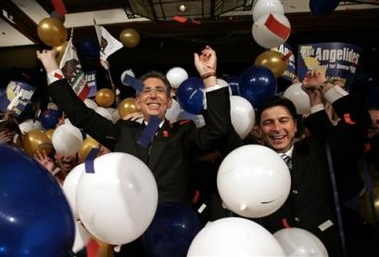On the biggest primary night of the election year, a Democrat emerged from a
bitter primary to win the right to challenge Gov. Arnold Schwarzenegger and a
former Republican congressman was leading in a still-undecided House race in
California that's seen as the strongest bellwether for the fall midterm
contests.

Democratic
gubernatorial candidate, state Treasurer Phil Angelides, left, and
Assembly Speaker Fabian Nunez, D-Los Angeles raise their arms in
celebration as balloons and confetti rain down during an election party in
Sacramento, Calif., early Wednesday, June 7, 2006. Angelides defeated
state Controller Steve Westly to win the nomination for Governor.
Angelides will face incumbent Republican Gov. Arnold Schwarzenegger.
[AP] |
State Treasurer Phil Angelides narrowly beat Controller Steve Westly in
California's gubernatorial primary, winning Los Angeles and San Francisco
counties. With 80 percent of precincts reporting, Angelides had 842,657 votes,
48 percent, to Westly's 772,547 votes, or 44 percent.
"I'm standing here before you tonight as the nominee for governor," Angelides
said early Wednesday, while his supporters chanted, "Go, Phil, go!"
Westly, a former eBay executive, poured $35 million of his own money into the
campaign, but was unable to overcome the labor unions that turned out the vote
for Angelides. A low turnout made the unions' efforts all the more important.
After primaries in eight states, votes were still being counted in the most
closely watched races, the special election to replace disgraced former GOP Rep.
Randy "Duke" Cunningham, who was convicted of corruption charges.
With 78 percent of precincts reporting, Republican Brian Bilbray was ahead
with 50,284 votes, or 50 percent, to Democrat Francine Busby's 45,649 votes, or
45 percent.
Elsewhere, Alabama Gov. Bob Riley easily beat back a GOP primary challenge
from Ten Commandments judge Roy Moore, while Democratic former Gov. Don
Siegelman, who campaigned while on trial on corruption charges lost his comeback
fight against the state's first female lieutenant governor. Also in Alabama,
voters passed a ban on gay marriage by a 4-to-1 margin.
Riley said voters saw state government has changed while he has been in
office. "People appreciated the difference in the level of corruption we had in
the past and the corruption we don't have today," he said. His challenger,
Moore, said: "God's will has been done."
Another Washington corruption case figured in Montana's primary, where GOP
Sen. Conrad Burns (news, bio, voting record) sought the nomination for a fourth
term. After his ties to disgraced lobbyist Jack Abramoff became known, Burns saw
his popularity fall. He beat several primary challengers and won nearly
three-quarters of the vote. His Democratic challenger in the fall will be state
Senate President Jon Tester.
In Iowa, the retirement of two-term Democratic Gov. Tom Vilsack set off a
wide-open race. Secretary of State Chet Culver will face GOP Rep. Jim Nussle
(news, bio, voting record) in the fall.
Mississippi, Montana, New Mexico and South Dakota also held primaries.
Corruption and allegations of corruption in California, Alabama and Montana,
crisscrossed the country. Immigration was a campaign issue from the South to the
Plains.
Still, the biggest race was the one to replace Cunningham, who was sentenced
to eight years in prison for taking bribes on a scale unparalleled in the
history of Congress. Democrats saw a rich opportunity to capture a solidly
Republican district and build momentum on their hopes to capture control of the
House.
National Democrats spent nearly $2 million on the race; the GOP spent $4.5
million. President Bush and first lady Laura Bush recorded telephone messages
for Bilbray, while the Democrats' last two presidential candidates - John Kerry
and Al Gore urged supporters to back Busby.
Bilbray, made immigration the centerpiece of his campaign, proposing a fence
"from the Pacific Ocean to the Gulf of Mexico" and restrictions to keep illegal
immigrants from collecting Social Security and other benefits.
Busby, a local school board member, focused her campaign on public
dissatisfaction with the Bush administration and the GOP-led Congress, and
assailed Bilbray for working as a lobbyist in Washington. She consistently
referred to him as "the lobbyist Bilbray."
In New Jersey, Republicans chose Tom Kean Jr., the son of a popular former
governor, to challenge Democratic Sen. Robert Menendez in the fall.
In the weeks leading up to Alabama's gubernatorial primary, polls showed
Riley with a growing lead on Moore, the former state chief justice who became a
hero to the religious right in 2003 when he was ousted over his refusal to
remove the Commandments monument from the state judicial building.
Lt. Gov. Lucy Baxley fashioned an "I Love Lucy" campaign, while Siegelman had
to campaign at night while on trial on corruption charges during the day. She
won with 60 percent of the vote while Siegelman got just 36 percent. Riley took
67 percent of the vote, and Moore 33 percent.
A few races brought back some familiar names:
- Jerry Brown ¡ª the former California governor, presidential candidate and
current Oakland mayor ¡ª won the Democratic primary for attorney general.
- George C. Wallace Jr., son of the former Alabama governor, trailed in the
GOP primary for lieutenant governor to attorney Luther Strange but the race goes
to a runoff because no one got 50 percent.
- Hollywood director Rob Reiner was the leading backer of a measure in
California to create a $2.4 billion universal preschool program, which went down
to defeat by a 60-to-40-percent margin.